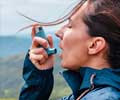Tens of thousands of severe asthma patients may be taking harmful doses of oral steroids because of their poor inhaler technique, reports a new study.

‘Asthma patients using high doses of oral steroids are at risk of serious adverse effects like osteoporosis, diabetes, and adrenal insufficiency.’





Dr Eger (MD), a PhD student and pulmonologist in training at Amsterdam University Medical Centre (The Netherlands), told the congress: "Asthma patients using high doses of oral steroids are at risk of serious adverse effects such as diabetes, osteoporosis, and adrenal insufficiency, in which the adrenal glands do not produce adequate amounts of steroid hormones. "Our findings show that many patients with severe asthma are taking harmfully high doses of oral steroids. Every prescription for oral steroids should alert doctors to assess adherence to inhaled therapies and inhalation techniques in these patients. Furthermore, now that there is an increasing number of biologic asthma drugs available that avoid the need for oral steroids, doctors should initiate biologic treatment in suitable patients to reduce exposure to harmful oral steroids."
Dr. Eger and her colleagues analyzed information from a pharmacy database of 500,500 Dutch inhabitants to identify patients who were using high doses of inhaled corticosteroids (500 micrograms or more a day) plus long-acting beta-agonists, and who were identified as having severe asthma according to the Global Initiative for Asthma (GINA). The database also contained information on oral steroid use (cortisone). The researchers sent questionnaires to 5002 of these patients and then analyzed 2312 that were returned. Information from the pharmacy database enabled them to collect information on oral steroid use and adherence to medication. Pharmacists assessed the inhaler technique in a sample of the patients.
The questionnaire asked about medical history, including any other medical conditions, asthma diagnosis and control, and smoking history. If prescriptions were completed, 80% or more of the time, the patients were considered to be adherent to their medication.
"We found that 29% of asthma patients who were using high doses of inhaled steroids were also taking harmfully high doses of oral steroids of 420 milligrams a year or more," said Dr. Eger. Of these patients, 78% had poor adherence to inhaled medication or incorrect inhalation technique. So these problems should be tackled first in these patients before considering biologic treatment. The remaining 22% are candidates for biologic drugs.
Advertisement
Dr. Eger said her research did not show why so many patients were overusing oral steroids and so few were receiving biologic treatments, but reasons could be that patients don't consult their doctors and that, when they do, the doctors don't assess them thoroughly or don't identify them as being candidates for biologic treatment.
Advertisement
"If they reduce exposure to harmful oral steroids and thus reduce the adverse effects, this could lead to a reduction in the cost of healthcare. Another important way to look at this is that patients can exercise more and experience fewer exacerbations of their disease, and so have fewer days off work due to illness."
The proportion of asthma patients who do not adhere to their inhaler medication or have poor inhaler technique is likely to be similar in other countries. However, access to biologic treatment may vary between countries.
"In The Netherlands, we have very good access to health care, and biologics are available to anyone who needs them. Unfortunately, this is not the case in every part of the world," said Dr. Eger.
Research shows that a lifetime, cumulative dose of between 0.5-1 grams of oral steroids is associated with adverse side effects. The risk increases with increasing doses.
Professor Guy Brusselle, from Ghent University, Belgium, is Chair of the European Respiratory Society Science Council and was not involved in the study. He said: "Oral corticosteroids are an important medication for acute treatment of moderate to severe asthma flare-ups; they reduce inflammation in patients' airways during acute exacerbations to make it easier to breathe again, thereby helping to reduce the risk of hospitalization. However, we know that overuse of oral steroids, such as frequent courses or chronic use, will harm patients' health over the long-term, as these medications have many side effects.
"Alternative treatments such as biologic drugs may offer one way to reduce long-term use of oral corticosteroids, but supporting patients to improve their inhaler technique and adherence to other asthma medications, mainly inhalers, will limit the need for the use of oral corticosteroids and help to protect the overall health of asthma patients better."
Source-Eurekalert















